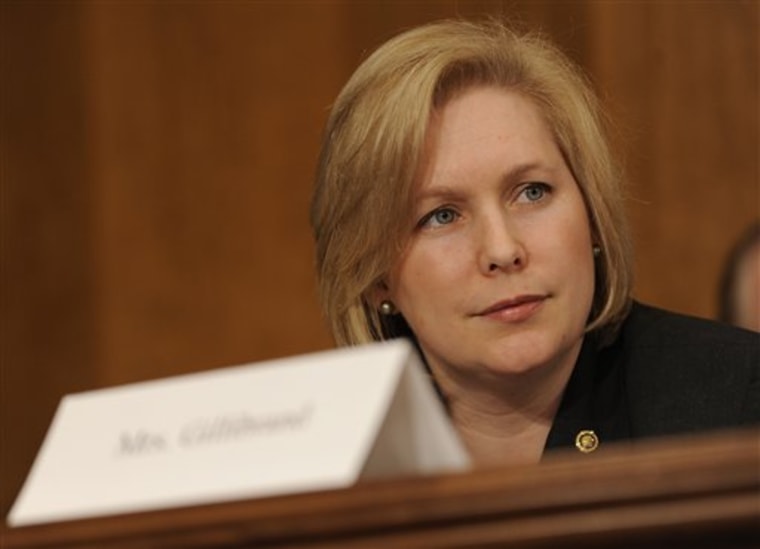Following tumultuous turnovers in Illinois and New York, lawmakers on Wednesday asked whether it was time to change the Constitution so that voters, and not state governors, fill Senate vacancies.
Appointments by governors, said Sen. Russ Feingold, D-Wisc., "are an unfortunate relic" of the first century of the nation's history when senators were picked by state legislatures. Feingold, a chief sponsor of a proposed constitutional amendment requiring elections to fill vacancies, spoke at a joint House-Senate hearing on the proposal.
Gubernatorial appointments have gained attention this year with the departures of four senators after the election: President Barack Obama, Vice President Joe Biden, Secretary of State Hillary Rodham Clinton and Interior Secretary Ken Salazar.
Former Illinois Gov. Rod Blagojevich was ousted from office and faces criminal charges for allegedly trying to profit from his naming of Obama's replacement, while New York Gov. David Paterson, before picking Rep. Kirsten Gillibrand to replace Clinton, became embroiled in the highly publicized and ultimately unsuccessful lobbying effort by Caroline Kennedy to get the job.
In Delaware, Gov. Ruth Ann Minner named longtime Biden aide Ted Kaufman with the understanding that he would not run in a special election in 2010, opening the way for Biden's son Beau, the state attorney general, to succeed him.
In Colorado, Democratic Gov. Bill Ritter named former Denver Public Schools Superintendent Michael Bennet to the Senate, even though Bennet had never held elected office. Republicans proposed changing to special elections, but a state Senate panel killed the bill on a party-line vote. Bennet replaced Salazar.
Many, said Rep. David Dreier, R-Calif., sponsor of the amendment in the House, "are understandably outraged at some of the gamesmanship that surrounded the most recent Senate appointments."
Supporters of the amendment said it would perfect the 17th Amendment to the Constitution, ratified in 1913, that required the direct election of senators. Feingold said that amendment grew out of public disgust with the corruption and political chicanery arising when state legislatures chose senators. "As we have seen in recent months, gubernatorial appointments pose the same dangers."
According to the National Conference of State Legislatures, governors in 38 states make appointments to fill Senate seats until the next regular scheduled general election.
Other states, such as Massachusetts, Wisconsin, Oregon, Oklahoma and Alaska, mandate special elections. The remainder have variations where governors make interim appointments followed within a certain time period by elections.
Two states changed their systems in 2004: the Massachusetts legislature moved to direct elections so that the then-governor, Republican Mitt Romney, couldn't pick a replacement if Democratic Sen. John Kerry won the presidency.
Alaskans approved a ballot initiative on state elections in 2004 after then-Gov. Frank Murkowski, a Republican, appointed his daughter Lisa to fill his vacated Senate seat. Lisa Murkowski captured the popular vote in 2004 to keep the seat.
"My constituents feel very strongly about this issue," said Democratic Sen. Mark Begich of Alaska, a cosponsor of the proposal.
Problems with the constitutional amendment were raised by several experts testifying at the hearing. They pointed out that it can take months to organize primaries and special elections, depriving states of representation in the meantime and that turnouts in special elections are usually low.
Rep. Jerrold Nadler, D-N.Y., cited the difficulty of raising, in a short time, the millions of dollars it takes to run a campaign in large states such as New York. He also brought up the scenario of a terrorist attack where a large number of senators are killed or incapacitated. Whereas the appointment process can be quick, an election requirement could leave the Senate crippled for months.
The Constitution states that elections must be held to fill all House vacancies.
There's also the difficulty of amending the Constitution, which requires two-thirds majorities in the House and Senate and ratification of three-fourths of state legislatures. Sen. Tom Coburn, R-Okla., noted that there have been more than 5,000 proposed constitutional amendments. So far only 27, including the 10 amendments of the Bill of Rights, have been ratified. The last, dealing with congressional salaries, was ratified in 1992.
Rep. Aaron Schock, R-Ill., proposed a legislative fix that would allow governors or state legislatures to appoint replacements but require that the appointee run in a special election within 90 days.
